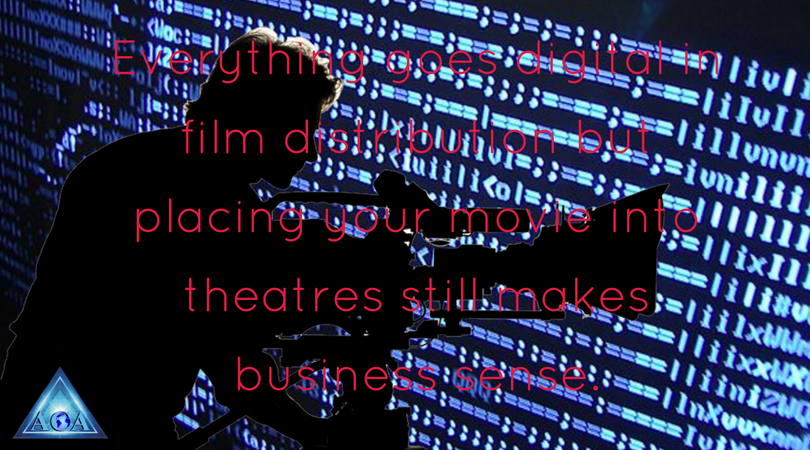Everything is going digital in film distribution.
Everything is going digital in film distribution, but placing your movie into theatres still makes business sense.
Recently, theatrical and DVD distribution, have been declining in profits, however the fact that almost 30 new movies open every week in theatres.
Category One: do-it-yourself movies: So, do-it-yourself distribution makes things even more confusing. In the case of DIY movies, a do-it-yourself approach for distribution is definitely the safest one. You can use Quiver Digital, for example, providing for a low upfront fee the submission of your film to the main digital platforms.
Category Two: is the movies that made with some kind of real budget. Before to try to distribute your film, arrange a screening with people you do not know in the audience, without you being present, and have them tell you in writing what they think about your film and its chances. If they like your film, a theatrical opening is still the cheapest way to promote your film. Why? Because, today, 300 hours of content will be uploaded every single minute on YouTube! In the same minute, more than 500 new websites will be created, presenting their own content as well. This is the real issue at hand: No matter how good your movie is, your audience has to know it even exists.
Why is theatrical still the most affordable way to get your movie seen? Because you need to use major media to promote your movie. When you open in New York, the New York Times will review your film, as will other newspapers and magazines, radio stations and maybe some TV stations. In fact, you can open a movie in New York for less than $25,000, in Los Angeles you can do it for less than $20,000. smaller cities might require only a few thousand dollars. In other words, opening theatrically gets the word out that your movie exists at a fairly reasonable cost.
“Every time you open a major city in a state, not only do you create a new market for theatrical exploitation, but—more importantly—you create one for your DVD and streaming market, which will come later on. Pushing even further, releasing in New York and Los Angeles opens your TV and foreign markets as well, seeing that the first questions a foreign buyer asks when offered a movie to buy are: “was it released theatrically in the U.S.?” and “how were the press and the box office?”
Can you pull off this release by yourself? Technically, you can, but practically speaking, it’s not easy. Theater chains will ask you to go through a distributor or an aggregator that they have an account with.
“Working with a distributor is expensive as the distributor will take a fee—around 30 percent—and recoup its own expenses before you see a dime. But it will provide all the people listed above and not charge you for most of them—and the sales force is always included in its fee.”
“Theatrical distribution is still essential to properly reach your audience, and the risk is very minimal, if not totally nonexistent. There’s one last benefit, beyond what I’ve said about theatrical promoting DVD sales and streaming. It’s that theatrical distribution is a weekly business. Say you have planned a 15-city release—it has to start the first week in New York, the second in Los Angeles, and so on. You will know the results of your first week after the opening weekend—less than $5,000 in ticket sales is not great, more than $10,000 is—and you will be able to modify your release.”
“On the other hand, if you had only booked New York and Los Angeles, and the first weekend goes through the roof, other theaters around the country will be calling your distributor—or will at least take your distributor’s call—and offer to expand your release to other cities.”
“Everything is decided and changed on a weekly basis—there’s no real risk. This is why most distributors will book New York and Los Angeles no matter what, in order to create a market for the film and focus all their efforts on these two cities.”
by Philippe Diaz
Philippe Diaz is a director and producer, and the founder and CEO of Cinema Libre Studio in Burbank.


